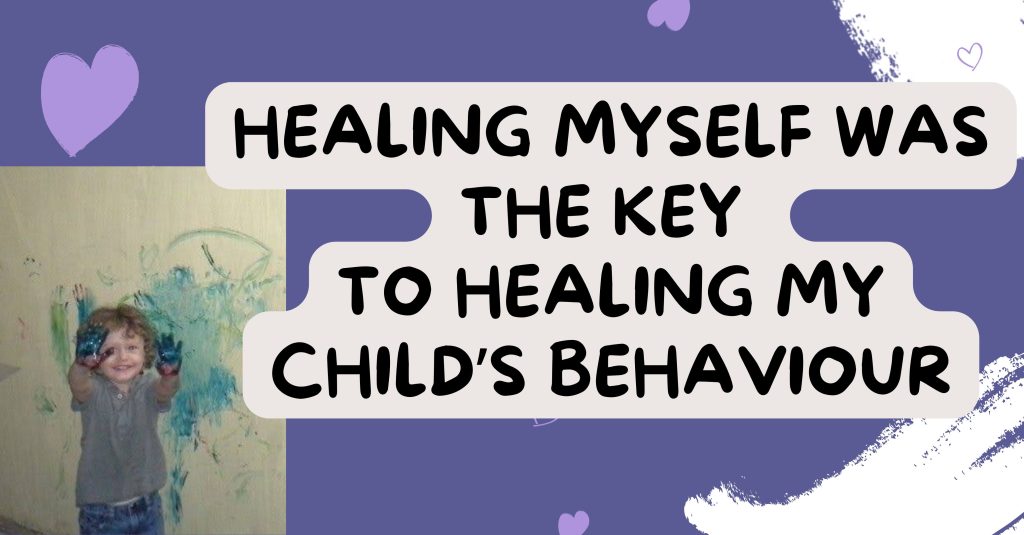Parenting is one of the most profound yet challenging roles we take on in life. A connected, loving infancy was easy for me, but by the time we hit preschool age, I wanted to quit parenting. My 3-year-old son’s behaviour was so chaotic—swinging from defiance to clinginess, and constant acting out—that I could not cope. I remember the day I spanked him because I felt so helpless. Family was telling me I had to reign the kid in or he was going to be a psychopath.
Any chance I had to pawn him off on other people, I took it. It got to a point where I did not like the child and did not want to be with him. The more I pulled away, the more unmanageable he became. The more I tried to enforce control, the more his behaviour seemed to escalate.
What I didn’t realise at the time was that his behaviour was not just random disobedience or rebellion—it was a mirror. It was reflecting back to me areas in my own emotional landscape that needed healing. His unmanageable behaviour was asking for me to connect and support him, but I kept pulling away. The traditional methods—control, discipline, and ensuring obedience—were backfiring miserably.
I had just found my way into practising BodyTalk when I hit my tipping point. I remember putting him in a “time out,” sitting him on the entry stairs while I sat in the kitchen with the door closed between us. We were both crying, feeling helpless and lost. The disconnection between us became unbearably clear. It was time to look inward and question not only how I was parenting but how I was relating to myself.
Through BodyTalk work, I began to uncover the ways my own emotional intelligence (EQ) and ability to hold space for emotions—both his and my own—were deeply lacking. Healing these patterns, the deeply held attachment wounds, and shifting into a Conscious Parenting approach completely transformed not only my relationship with my son but also his behaviour.
The work I did to heal myself changed our relationship, and with it, his behaviour so dramatically that a family member asked if I had medicated him!
In this blog, I’ll share why Conscious Parenting is a powerful approach for better behaviour in our children, how it differs from traditional parenting, and the lessons I learned from my own journey of healing and connection.
Expectations: Where Traditional Approaches Go Wrong
Parenting has traditionally been viewed through a lens of control. As parents, we are expected to teach our children how to behave, discipline them when they step out of line, and demand obedience. When our children resist or misbehave, it’s often assumed that something is “wrong” with the child and that they need to be corrected.
This mindset is rooted in expectations—expectations of how our children “should” behave, how life “should” go, and how our parenting “should” look. When these expectations aren’t met, it often triggers frustration, embarrassment, or even shame in the parent.
Often, the expectations of our culture do not match children’s developmental capabilities and are simply unrealistic.
In my own experience, I had unknowingly placed a huge expectation on my 3-year-old son to behave in a way that would make parenting feel easier for me. I wanted him to follow instructions, to sit still when asked, and to stop demanding so much of my energy. But what I didn’t realise was that his behaviour was not something to “fix”—it was something to understand.
What Traditional Parenting Misses
- Focus on Obedience Over Connection:
- Traditional parenting often emphasises obedience at the expense of emotional connection. This can lead to compliance in the short term but doesn’t address the root of the child’s behaviour.
- Overuse of Control:
- Children resist when they feel over-controlled. Traditional methods can unintentionally create power struggles or suppress the child’s individuality.
- Ignoring Emotional Needs:
- Acting out is often a sign of unmet emotional needs, but traditional approaches focus on correcting the behaviour rather than understanding the emotions behind it.
What is Conscious Parenting?
Conscious Parenting flips the traditional parenting model on its head. Instead of viewing children’s behaviour as a problem to fix, it sees behaviour as a symptom of deeper emotional or relational dynamics. It challenges the notion that discipline and control are the keys to raising “good” children, and instead focuses on the parent’s ability to cultivate self-awareness, emotional regulation, and deep connection.
At its heart, Conscious Parenting recognises that our children mirror and trigger our past wounds. Their behaviour presses all the right buttons, bringing to the surface our unhealed pain, outdated patterns, and unconscious beliefs. Far from being “bad,” these triggers are invitations—opportunities for us to heal ourselves so we can relate to our children from a place of presence and clarity.
In essence, Conscious Parenting isn’t about parenting the child—it’s about parenting our own inner child. It asks us to look inward and explore questions like:
- What emotions or patterns am I bringing into this relationship?
- What is my child’s behaviour reflecting about my own inner world?
- How can I meet my child’s needs while also holding space for my own emotions?
By shifting the focus inward, Conscious Parenting allows us to break generational cycles of disconnection, fear-based discipline, and suppressed emotions. It prioritises connection over control, curiosity over correction, and growth over obedience.
Everything changed.
When I started doing BodyTalk work, I began to uncover the truth: his behaviour was a reflection of my own inner struggles. I had grown up in an environment where emotions weren’t welcome, and I had very little emotional intelligence. I didn’t know how to feel my own feelings, let alone accept my son’s. When he was loud, needy or uncooperative, I would get triggered. I would react with frustration or disconnect from him because his emotions felt overwhelming to me.
Through the healing process, I learned to:
Feel My Feelings:
- We learn to regulate our emotions by being co-regulated by an emotionally present adult. However, the “crying babies go to bed” approach I experienced as a child left me alone with my big emotions. I experienced that emotions were not safe to feel, so I learned to suppress them and disconnect from my inner awareness.
- BodyTalk work helped me break through that numbness. For the first time, I could truly feel and process my own emotions. This self-awareness allowed me to respond to my son’s emotions from a grounded, compassionate place rather than from frustration or fear.
Regulate my own emotions:
- Instead of reacting with frustration or anger, I learned to pause, breathe, and ground myself.
Hold space for his emotions:
- I began to meet his tantrums with curiosity instead of control, asking questions like, “What’s really going on here? What does he need right now?”
Relate to him on his level:
- Instead of trying to impose my expectations, I learned to listen and validate his feelings, even when I didn’t fully understand them.
As I made these shifts, an incredible thing happened: my son’s behaviour transformed. He stopped acting out for attention because he no longer needed to. He felt seen, heard, and emotionally safe. What had once felt like chaos became an opportunity for connection.
Why Conscious Parenting Works
When we address our children’s behaviour through the lens of Conscious Parenting, we’re not just looking at the surface—we’re addressing the root causes.
Here’s Why It’s So Effective:
- Children Feel Emotionally Safe: When parents validate and hold space for their child’s emotions, the child feels safe to express themselves. This reduces the need for acting out or attention-seeking behaviour.
- Parents Become Role Models for Emotional Regulation: Children learn how to manage their own emotions by watching how their parents handle theirs. When we respond calmly and compassionately, our children internalize those skills.
- Behaviour Changes from the Inside Out: Traditional parenting often relies on external motivators (rewards, punishments). Conscious Parenting, on the other hand, fosters intrinsic motivation by building trust and connection.
- Connection Prevents Power Struggles: When children feel connected to their parents, they naturally want to cooperate. They no longer feel the need to resist or rebel to assert their autonomy.
How to Start Practising Conscious Parenting
If you’re ready to shift from control to connection, here are a few steps to get started:
- Heal Your Own Emotional Triggers: Reflect on what triggers you most about your child’s behaviour. Are there unresolved emotions or patterns from your own childhood that need attention?
- Practise Emotional Regulation: Learn to pause before reacting. Take a deep breath, ground yourself, and approach the situation from a calm and curious mindset.
- Validate Your Child’s Emotions: When your child is upset, instead of dismissing their feelings, acknowledge them. For example: “I see you’re really frustrated right now. That’s okay.”
- Prioritise Connection Over Correction: Focus on building trust and emotional safety with your child. When connection is the foundation, behaviour naturally improves.
- Let Go of Unrealistic Expectations: Release the idea that your child should behave perfectly all the time. Accept their imperfections as part of their growth process.
Parenting is not about being perfect; it’s about being present. My journey with my son taught me that behaviour is communication—and when we approach parenting from a place of connection, compassion, and curiosity, we create a space where our children can thrive.
If you’re struggling with your child’s behaviour, I invite you to look inward. Often, our children’s actions reflect our own emotional triggers, beliefs, or unresolved wounds. Through tools like BodyTalk, you can uncover and heal the subconscious patterns that may be impacting your relationship with your child.
BodyTalk works to address the underlying emotional and energetic blocks that affect how we relate to ourselves and others. As you heal yourself, you’ll naturally transform how you show up for your child—and in turn, their behaviour will shift as well.
Ready to experience this transformation? Reach out today to learn how BodyTalk can support you in creating a deeper, more harmonious connection with your child.


Your article is very informative. Parenting is the most important thing we can do to support the changes we wish in our world, yet the understanding of what we say, do and feel as we interact children is not taught and often we are so unaware. So glad there are people willing to explore and make the changes within to improve future human experiences in generations that follow us. Thank you Joanne